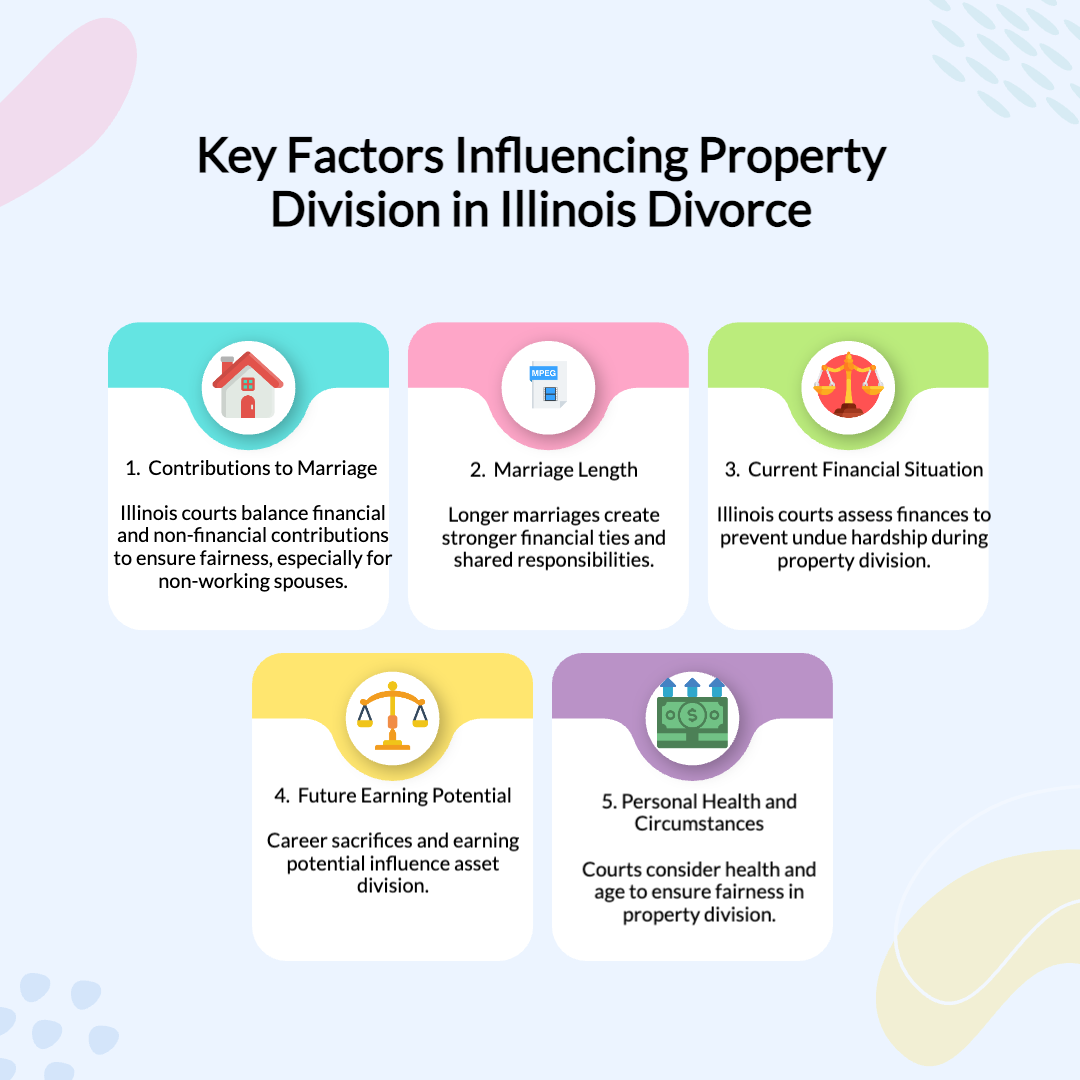Dividing property during a divorce can be one of the most challenging aspects of the process. In Illinois, understanding the factors affecting property division is crucial for anyone concerned about protecting their assets and securing their financial future. The courts follow the equitable distribution statute, 750 ILCS 5/503, which means property is divided fairly—but not necessarily equally.
By familiarizing yourself with these key factors, you can navigate the legal landscape more confidently and work toward a resolution that respects both parties’ contributions and needs.
What Factors are Considered When Dividing Marital Assets in Chicago?
In Illinois divorce law, “factors” refer to specific criteria that courts evaluate under the Illinois Marriage and Dissolution of Marriage Act, 750 ILCS 5/503. These factors guide judges in making individualized decisions about dividing marital assets and debts. Knowing these factors can help you anticipate how the court may assess your case and what you can do to advocate for a fair outcome.
Below, we explore the top five factors affecting property division in divorce in Illinois and explain how each one can impact your financial future.
1. Contributions to Marital and Non-Marital Property
Your contributions to the marriage, both financial and non-financial, significantly influence how property is divided:
- Financial Contributions: Income earned, assets acquired, and investments made during the marriage.
- Non-Financial Contributions: Homemaking duties, child-rearing, and supporting your spouse’s career or education.
Why It Matters: Many people worry that their non-financial efforts—like managing the household or sacrificing career opportunities—won’t be recognized. In Illinois, the court acknowledges these contributions. This means that if you’ve dedicated time and energy to supporting your family or to further your spouse’s career, the court will consider these efforts when dividing assets.
So, if you paused your career to raise children or manage the household, the court can consider this a valuable contribution. This can affect the distribution of property in your favor.
Example: A husband worked for 20 years while Wife dedicated herself to raising children. The husband spent 20 years contributing to a retirement account, while the wife didn’t earn an income. In Illinois, a judge will consider this and likely award a higher portion of the martial estate to the Wife to make up for not having any retirement savings.
2. Duration of the Marriage
The length of your marriage plays a crucial role in property division:
- Longer Marriages: Finances are often deeply intertwined, and both spouses may have made significant contributions over many years.
- Shorter Marriages: The division may focus more on restoring each party to their pre-marriage financial status.
Why It Matters: You might be concerned about how the court will value the years you’ve invested in the marriage. In longer marriages, there’s a greater accumulation of shared assets and possibly more significant sacrifices made by both parties. The court considers the duration to ensure that the division reflects the depth of the financial and personal partnership.
Example: In a 20-year marriage where one spouse supported the other through education or career advancement, the supporting spouse’s contributions are recognized, potentially leading to a more favorable division.
3. Economic Circumstances of Each Spouse
The court assesses each spouse’s current financial situation, including:
- Income and Earning Capacity: Salaries, bonuses, and potential for future earnings.
- Assets and Liabilities: Ownership of property, bank accounts, investments, debts, and financial obligations.
- Financial Needs: Living expenses, healthcare costs, and dependents’ support.
Why It Matters: If you’re worried about maintaining your standard of living post-divorce, especially if you have a lower income or limited earning capacity, this factor is crucial. The court aims to prevent undue financial hardship by considering each spouse’s economic circumstances.
Example: A spouse who has been out of the workforce for years may receive a larger portion of marital assets or spousal support to help bridge the gap until they can become financially independent.
4. Future Earning Potential
Consideration is given to each spouse’s ability to acquire assets and income moving forward:
- Career Opportunities: Education level, work history, skills, and employability in the current job market.
- Past Sacrifices: Time spent out of the workforce to support the family or spouse’s career.
- Age and Health: Factors that may enhance or limit future earning capacity.
Why It Matters: You may be concerned about how you’ll rebuild your financial life after the divorce, especially if you’ve sacrificed career opportunities. The court acknowledges these disparities, aiming for a division that considers your future prospects.
Example: If you left your job to relocate for your spouse’s career, the court may award you additional assets or support to compensate for your reduced future earning potential.
5. Health, Age, and Employability
Personal circumstances such as health and age can impact property division:
- Health Issues: Chronic illnesses or disabilities affecting the ability to work.
- Age: Nearing retirement age can limit future earning opportunities.
- Employability: Availability of suitable job opportunities based on skills and experience.
Why It Matters: Concerns about financial security are heightened if you’re dealing with health issues or are close to retirement. The court considers these factors to ensure that you have the necessary resources to maintain a reasonable standard of living.
Example: An older spouse with limited job prospects and health concerns may receive a larger share of assets or ongoing support to address these challenges.
Quick Recap of Property Division Factors
Understanding these five key factors can help you navigate the property division process more confidently:
- Contributions to Marital and Non-Marital Property
- Duration of the Marriage
- Economic Circumstances of Each Spouse
- Future Earning Potential
- Health, Age, and Employability
Every divorce case is unique, and other considerations—such as spousal maintenance, marital debts, and tax implications — may also influence how property is divided. By being informed about these factors affecting property division in Illinois, you can better prepare for negotiations or court proceedings.
Additional Resources for Illinois Equitable Property Division Question or Concerns
For more information on related topics, you might find these guides and articles helpful:
- Guide to Property Division in Divorce
- Rules for Selling Marital Assets During Divorce
- Divorce Property Division and Equitable Distribution
We’re Here to Help
If you have concerns about how these factors apply to your case, we invite you to schedule a consultation. Our experienced attorneys are dedicated to helping you understand your rights and work toward a fair resolution that protects your interests and family priorities.
Related Blogs:
- Civil Unions, Domestic Partnerships and Property Problems in Illinois
- Dividing a Dental Practice in Divorce
- Dividing Assets in Same-Sex Divorces
- Illinois SDU Payment Issues and Legal Solutions
- The Importance of Legal Representation in Chicago Divorce Proceedings
- Is My Educational Degree Subject to Division During My Divorce?
- Navigating Life Insurance Divorce Settlements
- Surviving Financially After Divorce in Chicago
- Seeking Temporary Support in an Illinois Divorce
















